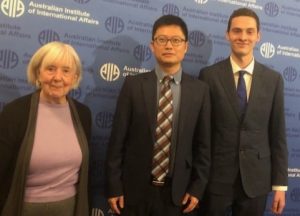A Global Trading System Fit For Purpose: Can Law and Diplomacy Work Together?
On Tuesday 1 August 2023, Dr Weihuan Zhou, Associate Professor of Law and Justice at UNSW, spoke to the Institute on the nexus between law and diplomacy in the global trade system. Dr Zhou believes that law and diplomacy are fundamental to rectifying current disputes in global trade. The principal goal of the presentation was to advance fresh perspectives in order for audience members to reevaluate their assumptions on global trade.
Dr Zhou began with a brief history of international trade prior to the establishment of the World Trade Organisation (WTO) in 1995. Before the Second World War, global trade was imperial. European empires would import raw materials from their colonies, refine those raw materials into products, and then export those products to captive colonial markets. This mercantilist economic order fuelled inter-European competition for markets and resources, ultimately leading to its destruction in the Second World War. Consequently, the US, the only major economy to survive WWII, designed a new economic order to prevent the return of imperial domination of world trade. As a result, the General Agreement on Tariffs and Trade (GATT), the predecessor of the WTO, was established in 1947.
GATT ensured that unilateralism, which had typified international trade for centuries, was deterred. Instead, GATT would foster a culture of international consensus through economic multilateralism, whereby trade barriers were reduced, and nations were governed by the same trade norms. Countries were incentivised to establish trade blocs, such as the European Coal and Steel Community, in order to generate economic growth. This was the beginning of modern globalisation.
Dr Zhou argued that – reminiscent of Adam Smith’s core doctrine in The Wealth of Nations (1776) – the reduction of trade barriers by GATT and the WTO has unleashed unprecedented economic growth, lifting millions out of poverty. Despite these significant achievements, international trade is flawed; global wealth remains skewed in favour of wealthy nations and corporations, and issues such as economic nationalism and protectionism remain unresolved.
Despite these valid criticisms, Dr Zhou argued that the WTO remains vital for global trade and economic prosperity. He maintained that the WTO has been remarkably more successful than any other trade system. Ninety per cent of decisions handed down by the WTO Appellate Body, the WTO branch that settles trade disputes, are complied with. China has complied with 99% of Appellate Body decisions. But Dr Zhou acknowledged that the length of Appellate Body decision-making and the lack of active remedies to redress trade disputes are impairing the WTO’s processes. The WTO is now failing in the principal aim it inherited from its predecessor: the prevention of unilateralism in international trade. The recent rise of economic nationalism has led to countries applying protectionist policies such as tariffs and market subsidies. The intersection of national security and supply chain vulnerability has eroded world trade. Allegations of product dumping by developing nations on to developed nations have damaged further economic integration. Most significantly, the decision by the US to veto new judges on the WTO Appellate Body from 2019 over allegations of judicial overreach jeopardises the existence of the WTO. These factors have coincided with the rise of bilateral trade agreements between nations which bypass the WTO’s multilateral trade agenda. Consequently, the WTO’s existence as an international institution has come into question.
But Dr Zhou cautioned that, in addressing these concerns, it is necessary to evaluate the WTO’s foreseeable future on empirical evidence. The WTO continues to pursue trade liberalisation as a core objective, illustrated by the landmark 2013 Trade Facilitation Agreement coordinated by the WTO. Dr Zhou was confident that the WTO Appellate Body will continue to be the preferable mechanism to settle trade disputes, if only due to the lack of alternatives. He suggested that, in order to preserve its future viability, the WTO should clearly define the parameters of its role in the international economic system. Dr Zhou concluded that diplomacy is vital to solving the plethora of challenges that the global trade system is experiencing. The enforcement of a rules-based trade order is pivotal to maintaining the WTO: only free trade can guarantee economic prosperity.
Responding to a question from the audience regarding China’s commitment to multilateralism, Dr Zhou noted that China is the greatest beneficiary of multilateralism. He referred to China’s stunning export-led economic growth over the last 30 years, which has primarily been facilitated through multilateral trade systems. Dr Zhou re-emphasised that China has a 99% compliance rate with WTO Appellate Body decisions.
In response to a question on how the WTO will affect emerging issues in the global trade system, such as the former Chinese tariff on Australian barley exports, Dr Zhou stated that Australia, in the interests of negotiation, had suspended its decision to bring China before the WTO Appellate Body. While the WTO certainly plays a role in resolving emerging disputes, other multilateral and bilateral forums are also important.
In response to a question concerning how the WTO is reacting to trade tensions between Beijing and Washington, Dr Zhou stressed that multilateralism must prevail in order to prevent conflict. He contended that, if neither country accepts the other’s economic influence, then Sino-American relations will continue to deteriorate.
Report by Matthew Vasic, AIIA NSW Intern

From left to right: AIIA NSW councillor, Jocelyn Chey, speaker Dr Weihuan Zhou and intern Matthew Vasic